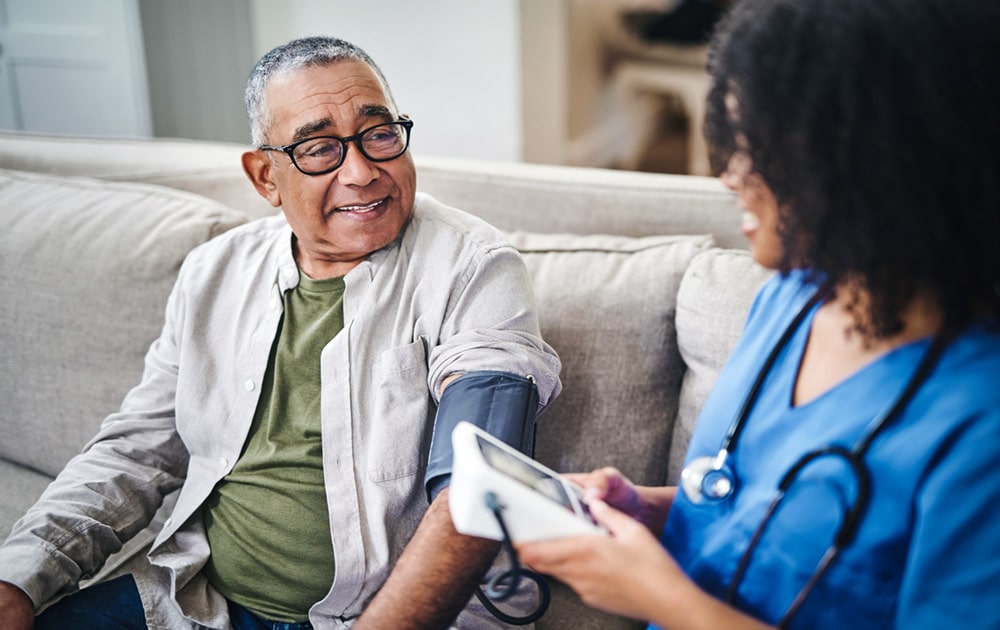
Assistance With Activities Of Daily Living: How To Support Your Senior Parent
March 20, 2023
Your Most Common Hospice Questions Answered
April 14, 202310 Benefits of Home Healthcare After Surgery for Seniors and How to Access Them
Table of contents
- Why might seniors need temporary home care after surgery?
- The benefits of home healthcare after surgery
- What are the different types of home healthcare after surgery?
- Does Medicare cover home health after surgery?
- How do you get home healthcare after surgery?
Recovering from surgery at any age can be a daunting experience. Even more so as we get older.
If your senior parent is scheduled for or has recently undergone a surgical procedure, it’s essential to consider the best options for their recovery.
One of those options is home healthcare. With the right support, your parent can recuperate in the comfort and familiarity of their own home, leading to a smoother, safer, and more positive recovery experience. Research has shown the numerous benefits of home healthcare after surgery for seniors.
Read on to learn how home health care can make all the difference during this critical period.

Why might seniors need temporary home care after surgery?
Home healthcare refers to a range of services given in your parent’s home to treat illnesses or injuries. It’s often more convenient and just as effective as the care they would have gotten in a hospital or skilled nursing facility. Additionally, patients report preferring to recover from surgery at home.
Your parent may have new healthcare needs after surgery. Most will be temporary, but they may have some new health issues or equipment they need to adapt to.
Depending on the type of surgery they had and their other health care needs, your parent could experience any of the following as they recover from surgery:
- Pain
- Healing surgical wounds
- Trouble moving or walking
- Fatigue or weakness
- New medications (some of which might be injections or intravenous)
- New medical equipment to learn
- New dietary restrictions
- The risk of complications from surgery
The first few days after they return home from surgery will likely be the most challenging. To help your parent heal fully, it can be beneficial to have home healthcare providers provide assistance, support, and education during this crucial time.
The benefits of home healthcare after surgery
With hospital stays becoming shorter and shorter, it’s not unusual for patients to leave the hospital after surgery while still needing at least some additional medical care.
Depending on the amount of care needed, some seniors may spend time at a skilled nursing facility or a nursing home after discharge. Others elect to recover from surgery at home with the help of a home care agency.
The benefits of home healthcare after surgery for seniors include:
- A comfortable and familiar environment that can reduce stress and anxiety
- Your parent’s preferred clothes, personal items, foods, etc., are always at hand
- Freedom from the light and noise of staff and other patients, especially at night.
- One-on-one care from a home health provider
- Ease of family involvement with care (if desired)
- Skilled nurses follow your parent’s provider’s instructions and report back on their progress
- Care is available at flexible times
- More freedom to walk or move around than in a hospital or facility
- No need to travel to numerous appointments each week
- Friends and family can visit without the restrictions of visiting hours
Additionally, Medicare patients who received home healthcare after an inpatient admission had better health outcomes than patients who didn’t receive home health. This includes significantly fewer hospital readmissions at 30, 60, and 90 days plus lower healthcare costs.
Patients who had initially been admitted to the hospital for surgery and then transitioned to home healthcare had even lower rates of readmission than similar patients who had been admitted for a medical diagnosis.
What are the different types of home healthcare after surgery?

Home care after surgery consists of care provided in your parent’s residence by several different specialties, depending on the type of surgery your parent had and their other health needs.
Home health nurse
After surgery, your parent may have multiple medical needs that they didn’t have before. These might include wound care, new medications, or the need for specialized monitoring. Visits from a home health nurse after surgery can help your parent manage this care in the comfort of their home.
Home health nurses also provide education on managing your parent’s condition and preventing complications. They can also coordinate with other healthcare providers to ensure your parent receives comprehensive care.
In-home physical therapy
It’s not unusual for seniors to experience weakness, limited mobility, or pain after surgery. An in-home physical therapist can assess your parent’s post-surgical abilities and limitations. They will then develop a personalized plan to help your parent regain strength, improve mobility, and manage discomfort. They may also provide education on how to prevent future injuries or complications.
In-home occupational therapy
If your parent has difficulty with daily tasks such as bathing, dressing, or cooking, an occupational therapist can help. In-home occupational therapy may include exercises to improve your parent’s strength, flexibility, and coordination. It could also include training on adaptive equipment or modifications to make daily tasks easier.
In-home speech therapy
Depending on the type of surgery that your parent had, they may have difficulty speaking or swallowing effectively. This is where an in-home speech therapist can help. A speech therapist can visit your parent’s home to assess. Then they’ll create a treatment plan with personalized exercises and strategies to help your parent swallow or communicate better.
Does Medicare cover home health after surgery?
Seniors who meet Medicare’s criteria can receive home health after surgery under either Medicare Part A or Part B.
Medicare Part A covers costs related to an inpatient hospital stay. If your parent spent at least three consecutive days in a hospital or skilled nursing facility (SNF), Part A will also cover their first 100 days of home health care. If your parent’s surgery didn’t include a qualifying inpatient stay, they could receive home health services under Part B.
Whether covered under Part A or B, seniors need to meet the following criteria to be covered for home health services. There’s typically no deductible or coinsurance for Part B-covered home health care.
To qualify for home healthcare after surgery under Medicare, seniors must:
- Be considered homebound according to Medicare’s rules (see below)
- Require skilled care on a part-time basis for up to 21 days to improve, maintain, or prevent deterioration of a health condition (although this can be extended)
- Be under the care of a nurse practitioner, clinical nurse specialist, physician’s assistant, or doctor
- Receive home health care services from a Medicare-approved home health agency
Medicare considered seniors to be homebound if they:
- Need the help of another person or medical equipment such as crutches, a walker, or a wheelchair to leave the house due to their illness or injury.
- A doctor believes your parent’s health or illness could worsen if they leave the house.
How do you get home healthcare after surgery?
Parentis Health makes it easy for seniors to get high-quality home healthcare after surgery.
Whether it’s medication management, wound care, or post-operative rehabilitation therapies, we can help your parent to start receiving the home healthcare they need to support their recovery in a few simple steps:
Step 1. Ask your doctor for a referral to Parentis Home Health
Step 2: We review your eligibility and obtain authorization
Step 3: Our staff reach out to schedule an assessment within 24-48 hours
Step 4: Following the assessment, we work with your parent to schedule the needed skilled services
Home health services are personalized to meet your parent’s unique needs and provided in the convenience of their home with their schedule in mind.
If your parent has an upcoming or recent surgery, contact us today to talk about how we can help!

